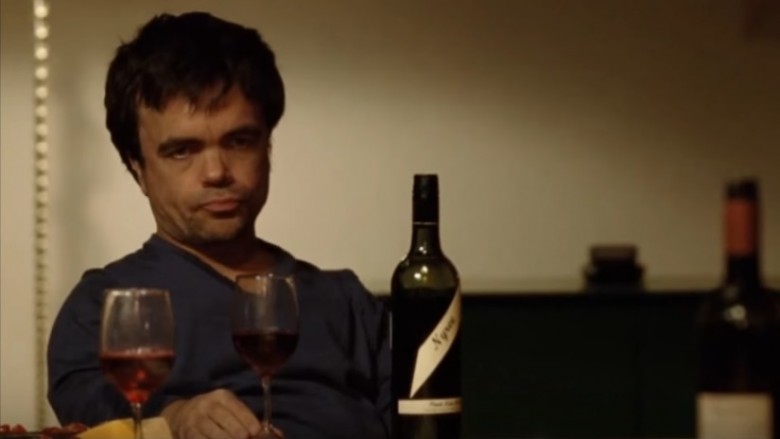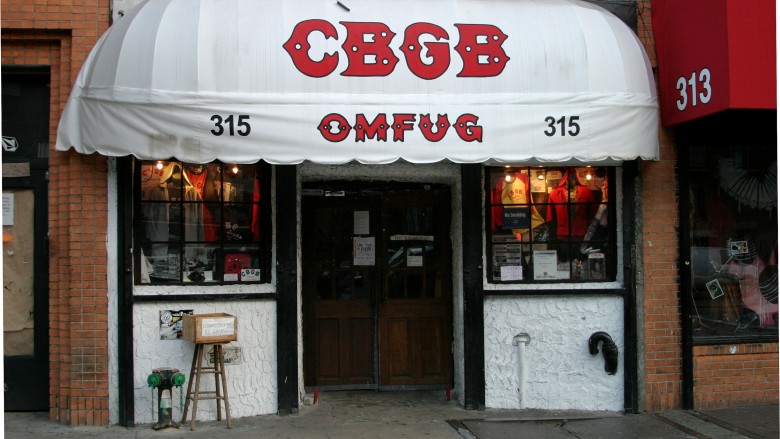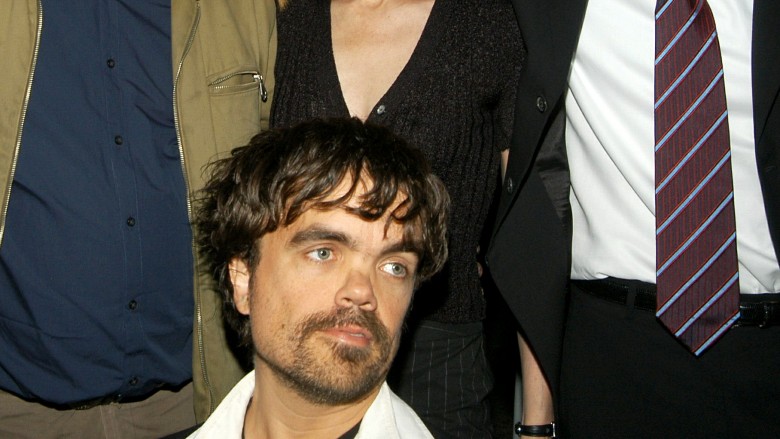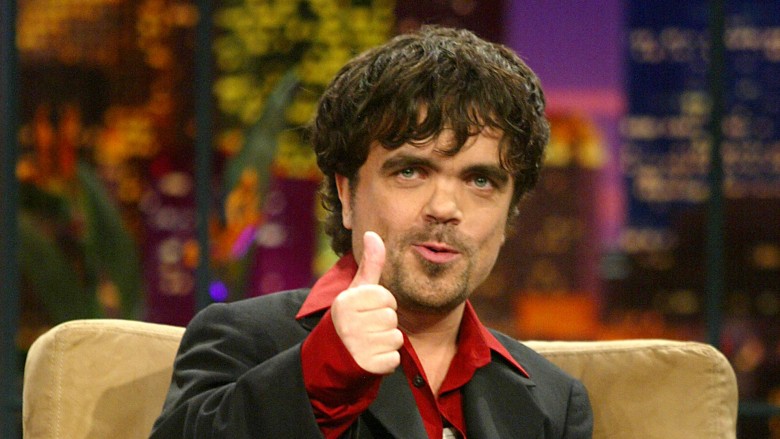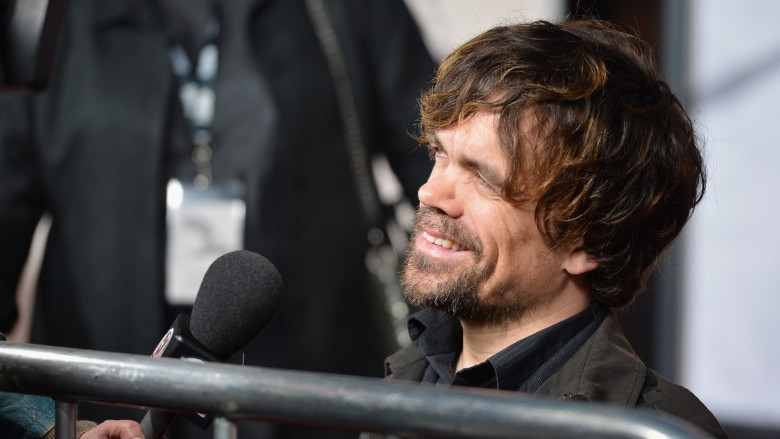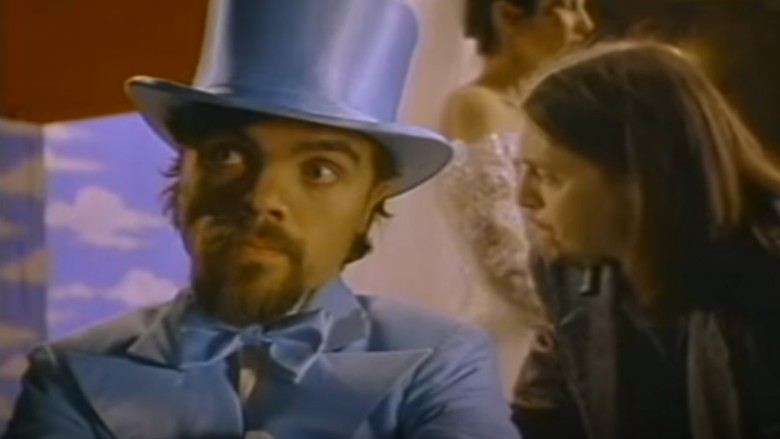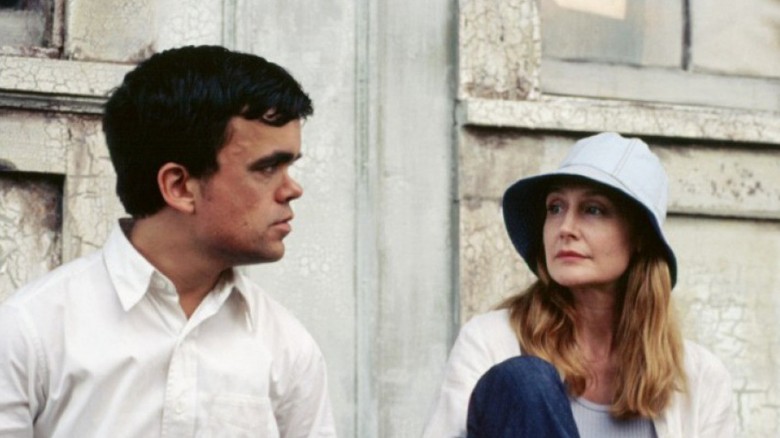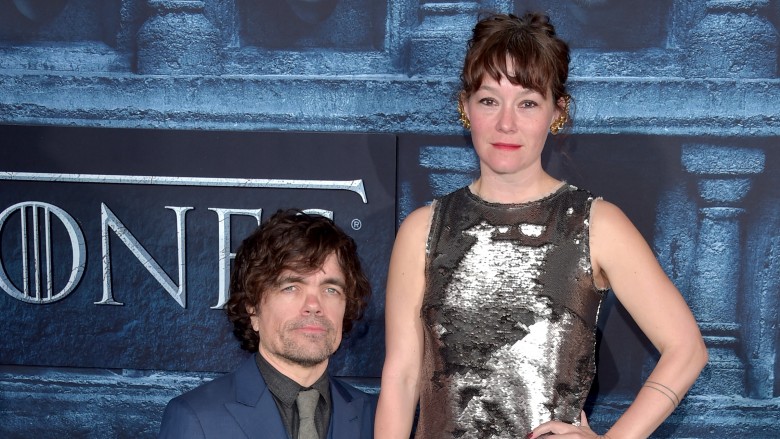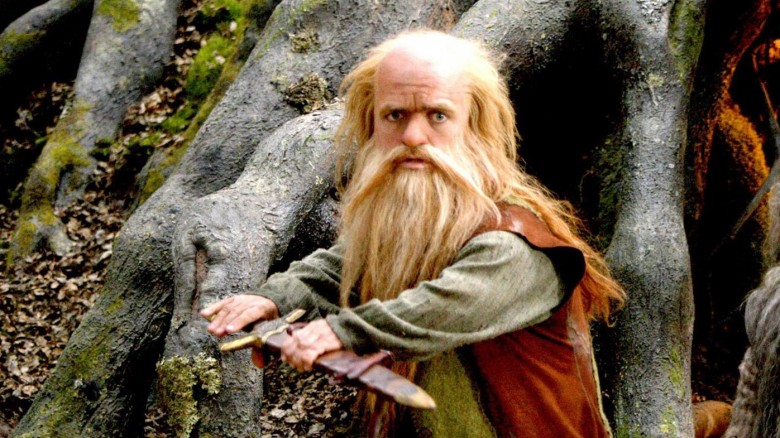How Peter Dinklage Went From A Rat-Infested Apartment To Becoming Tyrion Lannister
Peter Dinklage has come an awfully long way since putting on puppet shows for elderly neighbors in the basement of his parent's New Jersey home, something he and his brother used to do on a regular basis as kids. While Jonathan Dinklage is now a successful violinist, his sibling has gone on to achieve levels of fame neither of them could have imagined at the time, carving out a place for himself in pop culture history as Tyrion Lannister in HBO's Game of Thrones. The road to Westeros was not a straightforward one, however.
The son of an insurance salesman and an elementary school music teacher, Dinklage graduated from Vermont's Bennington College in 1991 and spent the months that followed couch surfing, relying on friends to put him up while he attempted to make it as an actor. So what happened to him between near-homelessness and superstardom? This is how Peter Dinklage went from a rat-infested apartment to becoming Tyrion Lannister.
His first apartment
Dinklage and college classmate Ian Bell decided to move to New York City in pursuit of careers in the arts, renting a rundown apartment under the Williamsburg Bridge as their base of operations. The whole place would shake when trains passed overhead, and to top it off, there was no heat or means of cooking their food—the oven was a regular hangout for the building's rat population. Dinklage knew better than to complain to their landlord, however, as previous attempts to get him to spruce up the place ended with him pulling a knife on them in what passed for their living room. "It wasn't really a living room," Dinklage told the New York Times, "just a big empty space that we dreamed of doing True West in. But we ended up drinking too much and had one poetry reading."
The idea was to found a new ensemble based on Chicago's famous Steppenwolf Theatre, founded in a church basement by Gary Sinise, Terry Kinney and Jeff Perry in the mid-'70s. Dinklage has often referred to Steppenwolf's take on True West as the show that made him want to act, calling the 1984 production his "linchpin." In the end their ambitions came to nothing and the pair were forced to find a new arrangement, coming home one day to find the door bolted shut. Bell moved to Seattle where he eventually found work, though Dinklage decided to stick it out in NYC.
He was in a band called Whizzy
After his theater dream failed to come to fruition, Dinklage decided to give the music industry a shot, though the genre he chose to pursue might come as a surprise to fans of his GoT character. In an interview with Playboy, the actor revealed he spent a number of years as a member of an NYC-based punk and funk outfit named Whizzy, playing the trumpet as well as contributing the occasional rap. When the men's mag asked him about the scar that runs from his eyebrow to his neck, Dinklage told them it was acquired during a show at famous Manhattan punk venue CBGB.
"I was jumping around onstage and got accidentally kneed in the temple," Dinklage said. "I was like Sid Vicious, just bleeding all over the stage. Blood was going everywhere. I just grabbed a dirty bar napkin and dabbed my head and went on with the show. We didn't care much at the time about personal safety. We were smoking and drinking during our shows, and one time my bass player fell off the back of his amp because he passed out. It was one of those bands."
He worked in data entry for 7 years
Dinklage soon came to realize that Whizzy wasn't going to pay the bills and started looking for a 9-to-5 job so he could afford to stay in the city. He ended up landing with Professional Examination Service, a New York City-based company specializing in assessment and certification in the field of higher education. Not that Dinklage ever knew that. "I still don't know what the company did," he admitted. "But I just, like, plugged information into a computer. I stuck it out because they let me. It was goofy, I had a little cubicle, I made people laugh, I smoked cigs with the guys from the mail room. They didn't seem to mind that I called in sick every Friday because I would go out Thursday night with my friends and get drunk."
Dinklage's friend Brendon Blake (who joined the actor at their favorite city restaurant for an interview he did with Esquire) was on hand to confirm that the Game of Thrones star used to consume the same amount of alcohol as his drinking buddies, despite his smaller stature. "Pete would get twice as wasted as we would because he's, like, half as big. He'd fall asleep in my apartment with his boots on. We called it his 'boots phase.'"
He said no to demeaning roles
The real reason Dinklage spent a number of years struggling to break through as an actor was his point-blank refusal to accept the kind of demeaning roles that people of his stature are normally limited to. From the Munchkins of Oz to the Goblins of Gringotts, not a lot has changed for actors of restricted growth since their size was first exploited by Hollywood, and Dinklage's turn as Tyrion Lannister is "very much the exception, not the rule" according to expert in the field Tom Shakespeare. While his work on Game of Thrones has been an inspiration for differently abled actors, it didn't come easy for Dinklage.
"I said no a lot," he revealed. "A lot. I just wasn't going to lay down that foundation of doing anything that made me feel a little dirty at the end of the day. Because if the only part is playing a leprechaun in a beer commercial, I'd rather go back to my cubicle and do data entry and make my rent that way. Which is what I did, for years. But if you take those sorts of roles, they'll just keep coming and nothing will change. ... 'No' is a very powerful word. Sometimes it should be utilized." Dinklage brought the issue of discrimination against dwarfs to the attention of the world in 2012 when he used his Golden Globes acceptance speech to namedrop Martin Henderson, an English man with the same condition whose own acting career was ended when a drunk sports fan picked him up and tossed him during a night out.
He made peace with his size
It took a number of years, but eventually Dinklage came to realize that he had to use his dwarfism to his advantage without allowing himself to be exploited in the process. When he was starting out, however, the New Jersey native was convinced he'd never play a part that wasn't defined by his height, and it almost made him quit the industry before he ever really got going. "I started to build up a resentment," Dinklage revealed. "And that fueled my desire to live in a cold apartment and be like: 'I don't need you! I'm gonna write poetry. Why would I want to be a member of your club if you don't want me?'"
Dinklage has admitted on several occasions that he could be guilty of seeming arrogant, but that stance slowly began to soften as he got older. "I expected the entertainment business to see only my size and nothing else," he said. "So I wanted to pretend my size wasn't who I was at all and do roles that had nothing to do with it. But I was completely limiting myself and my career, because it is who I am. Look at roles like Tyrion. My size is obviously why I got the part. I wouldn't be playing Tyrion if I wasn't this size."
His first feature film
Dinklage's big break came in 1995 when he was cast in his first feature film, the Tom DiCillo indie dramedy Living in Oblivion. Like most professions, it turned out not to be a case of what you know but who you know, as Dinklage himself confessed. "I started meeting friends who were writers and directors, and I found a back door," he said. "They put me in independent films." He didn't have to do much research for his part in DiCillo's movie—a frustrated dwarf actor hired to take part in a dream sequence. "Do you know anyone who's had a dream with a dwarf in it?" Dinklage's character demands of his director (Steve Buscemi). "No! I don't even have dreams with dwarfs in them. The only place I've seen dwarfs in dreams is in stupid movies like this!"
It was the start of a working relationship with Buscemi that led to further collaborations, including 2002's 13 Moons, 2009's St John of Las Vegas, and 2010's Pete Smalls is Dead. When Vanity Fair asked Dinklage about his friendship with Buscemi, he jokingly told them he couldn't stand the man before revealing his true feelings. "I love working with him. I love working with the same actors repeatedly. That happens a lot. It's kind of inevitable, especially if you work with the same writers and directors and you start to form a company of actors. You gravitate towards each other. I prefer it that way. You skip the small talk and go straight for the good stuff."
His breakout role
The part of Finbar McBride in 2003's The Station Agent wasn't originally written for a dwarf actor, which is what attracted Dinklage to the film's bitter lead character. Tom McCarthy (who rewrote the role for Dinklage when he found out he was interested) is one of the friends Dinklage credited with opening his back door into the movie business through indie projects, and he was full of praise for the writer/director during the Station Agent press tour. "Often roles written for someone my size are a little flat," Dinklage told IGN. "They're not sexual, they're not romantic, they're not flawed. And I love this about this character that Tom wrote... He has this stuff going on. He has romance. He's got romantic feelings. He's got anger and he's got flaws."
Critics agreed, and the film ended up with an impressive 95 percent score on Rotten Tomatoes, with pretty much every review mentioning Dinklage's performance. Stream on Demand said that "for the first time in his career, Dinklage was allowed to play someone with dimension, passion, and an identity beyond his physical attributes," Empire wrote that "Dinklage proves himself a subtle actor and gifted comedian," and late, great film critic Roger Ebert said "there is no good reason why Peter Dinklage could not play [William Wallace in] Braveheart."
He met his wife over a game of Trivial Pursuit
What better way to impress a lady with your intellect than a game of Trivial Pursuit? Dinklage's best friend Jonathan Marc Sherman (just 'Sherm' to Dinklage, who in turn gets 'Dink') and director Erica Schmidt were discussing an upcoming play at the former's apartment one evening when Schmidt started to complain about the lack of a good man in her life. Sherm decided to play matchmaker, scrolling through his contacts in search of an eligible bachelor. "I said, 'Let's see if there's anyone who'd be right for you, we'll invite him over and play Trivial Pursuit or something," Sherm told Esquire. "When we got to Pete, I hesitated. And she was like, 'Why are you hesitating?'
"I told Erica, I said, 'I'm hesitating because this is my best friend for ten years. He's amazing. But if you f— this up, you and I can't be friends anymore." As it turned out, she didn't—in fact, she and Dinklage have been a couple ever since, tying the knot in 2005 and welcoming their first child into the world in 2011. Oh, and in case you were wondering, Dinklage won the game of Trivial Pursuit.
He almost turned down the role of Tyrion
While he followed up The Station Agent with a number of roles that had nothing to do with his size in films like Jack DiNorscio biopic Find Me Guilty, both versions of Death at a Funeral and, more recently, Hollywood comedies like Pixels and The Boss, he did agree to one typical little person part in 2008. Dinklage took on the role of Trumpkin the red dwarf in The Chronicles of Narnia: Prince Caspian after a meeting with director Andrew Adamson, who allowed him to bring his particular brand of cynicism to the character and make it his own.
While the actor enjoyed his time on the other side of the wardrobe, the experience left him a little wary and he needed some convincing when GoT co-creator and showrunner David Benioff came calling. "I had one hesitation because of the fantasy genre," Dinklage admitted during his 2015 Reddit AMA. "I told him I didn't want a really long beard and pointy shoes, and they assured me this character and this world wasn't that. They told me about his complexity, the fact that he wasn't a hero or a villain, that he was a womanizer and a drinker, and they painted a flawed and beautiful portrait of him, so i signed on."

